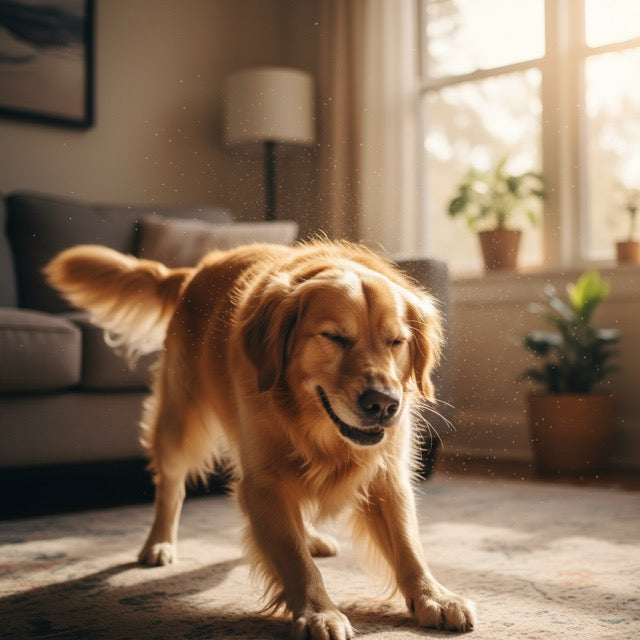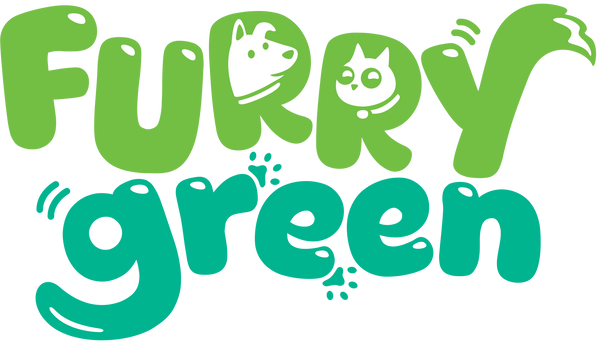
What Does It Mean When Your Dog Sneezes? 4 Common Causes + When to See a Vet | FurryGreen Pet Care
Share
Why Do Dogs Sneeze? Understanding the Causes from Play to Problems
💡 Sneezing in Dogs: Not Always a Sign of Illness!

Many owners worry when their dog starts sneezing, thinking it means illness or allergy — but that’s not always the case! Sneezing can be a normal physiological reaction or even a social signal. The key is to understand the context and frequency.

🐾 Cause 1: Normal Exploration Reaction 👃🏻
Dogs use their noses to explore the world. When sniffing around, dust, pollen, or strong odors can irritate their nasal passages, triggering sneezing. This helps clear out irritants, and it’s completely normal.
👉 Tips:
- Avoid walking your dog in smoky or heavily perfumed areas.
- Occasional sneezing during walks is nothing to worry about.

🎉 Cause 2: “Play Sneezing” When Excited 😄
During playtime or when overly excited, dogs may “play sneeze.” This is a friendly social signal, showing that your dog feels relaxed and happy — not sick!
👉 Look for:
- Wagging tail and playful posture.
- Sneezing stops once the excitement is over.
Nourish Them From the Inside Out
A healthy diet supports your dog's immune system and overall well-being. Try Furry Green's fresh, human-grade dog food today.
Shop Fresh Dog Food
🌿 Cause 3: Allergies or Environmental Irritants 🌬️
Frequent sneezing may result from environmental allergies — dust, pollen, cleaning products, or cigarette smoke. Seasonal allergies (like spring pollen) are also common in dogs.
👉 Tips:
- Keep your home clean and well-ventilated.
- Avoid using strong-scented cleaning agents.
- If allergies persist, consult your veterinarian.

🚨 Cause 4: Health Problems That Need Attention 🏥
If sneezing becomes persistent or severe, or if your dog has nasal discharge, nosebleeds, or facial swelling, seek veterinary care immediately. Possible causes include:
- Nasal foreign bodies (e.g., grass seeds)
- Respiratory infections (viral or bacterial)
- Nasal tumors or polyps
- Dental infections extending into nasal sinuses
👉 Red Flag Symptoms:
- Frequent or continuous sneezing for several days
- Bloody or thick nasal discharge
- Facial swelling or eye tearing
❤️ Summary: Observe, Don’t Panic
Sneezing is usually harmless, but consistent observation helps you spot when it’s not. Normal sneezing = environmental or emotional. Persistent sneezing = possible medical issue → time to see a vet.
👉 Understanding why your dog sneezes helps keep your furry friend healthy and happy!
Frequently Asked Questions
Is it normal for my dog to sneeze while playing?
Yes, this is called "play sneezing" and it's a completely normal and positive social signal. It indicates your dog is excited and having fun, and is used to show other dogs that their rough play is not aggressive.
When should I be worried about my dog's sneezing?
You should consult a veterinarian if your dog's sneezing is persistent, severe, or accompanied by other symptoms like bloody or thick nasal discharge, nosebleeds, facial swelling, lethargy, or loss of appetite.
Can allergies cause my dog to sneeze frequently?
Yes, allergies are a common cause of frequent sneezing in dogs. Environmental allergens such as dust mites, pollen, mold, and strong scents from cleaning products or perfumes can irritate your dog's nasal passages and trigger sneezing.
📚 References
- eClinPath – Respiratory Tract Overview & Nasal Disease in Dogs (https://eclinpath.com/)
- Merck Veterinary Manual – Sneezing and Nasal Discharge in Dogs
- American Kennel Club (AKC) – Why Do Dogs Sneeze? Common and Playful Reasons Explained (2023)
- Cornell University College of Veterinary Medicine – Canine Upper Respiratory Diseases
